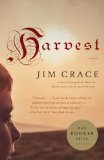Summary | Excerpt | Reviews | Beyond the Book | Readalikes | Genres & Themes | Author Bio

The harvest teamwork allows us to be lewd. Our humor ripens as the barley falls. It's safe to spread the gossip noisily, it's safe to bait and goad, Who's sharing wives? Which bearded bachelor is far too friendly with his goat? Which widower (they look at me) has dipped his thumb in someone else's pot? Which blushing youngsters are the village spares, that's to say those children who've been conceived in one man's bed and then delivered in another's? Who's making love to apple tubs? Who's wedded to a sack of grain? Nothing is beyond our bounds, when we are cutting corn.
So it was hardly a surprise yesterday that once "Mr. Quill" in Master Kent's close company was attending with his survey sticks and measuring tapes to the shape and volume of our fallow field and so beyond hearing, we wondered, out loud, whether our visiting townsman had ever overcome his undisguised deficiencies to secure himself a willing wife. Was he a husband yet? And, if he was, what blushing pleasures might Mistress Quill take from such staggering and stiffness and from having such a likeness of her hairy private part upon her stumbling lover's chin? "I'd like to take a scythe to him," said my neighbor John. Another said, "I'd rather take my wooden staff to her." And then of course the bawdiness increased with such play on the prospect of caressing Mr. Quill's three- cornered beard and Mistress Quill's twin attribute that every time that evening and in our company he ruminated with his hand around his chin, as was his habit, the women there could barely plug their grins while their men looked on, biting their lips. "And have you noticed his white hands?" one of our village daughters asked. "I wonder if he's ever dirtied them . . . other than to . . ." No, she would not finish. What she had in mind did not seem possible.
It was only when the gentleman returned in the fullness of the afternoon and stood at our backs on the bristle of the field to quantify and measure us that we began again to wonder what awaited these treasured neighborhoods and to feel uneasy. What was he wanting from our soil, what were his charts securing? We saw his finger wagging on the count. We heard him numbering, until he reached the paltry fifty- eight that represented us. We know enough to understand that in the greater world, flour, meat and cheese are not divided into shares and portions for the larder, as they are here, but only weighed and sized for selling. Was Mr. Quill the confirmation of the rumor that had gone about our doors that Master Kent was in such narrows now he was a widower that he would need to measure and sell our land? No amount of openness and jollity could raise our spirits once that fear took hold. Our observer's ready smile was menacing.
We were slow to broadcast our alarm. But we tackled our last barley stands more silently, less lewdly— and more scrupulously, as we were being watched. Now each barking deer or woodcock call was a warning. Each darkling cloud reminded us how nothing in our fields was guaranteed. We only muttered to ourselves, too anxious to raise our voices loud enough to reach our neighbors down the reaping line. Some of the younger men set faces which declared they'd defend our acres with their lives or with the lives of anyone that crossed them. The usual silent swagger. Rather than speak up, they turned their anger on the pigeons and the rooks, and on a handful of our master's near- white doves, which had descended on the stub and were already robbing fallen grain that, by ancient gleaning rights, should have been ours. These "snowy devils," their out- of- season whiteness making them seem even more coldly pea- eyed and acquisitive than their gray and black companions, were feasting on our bread and ale, they said, and sent the children to use their slings or shower them with handfuls of grit or yell the thieves away, anything to evidence our tenancy. The air was full of wings and cries. So our final harvesting gained ground.
Excerpted from Harvest by Jim Crace. Copyright © 2013 by Jim Crace. Excerpted by permission of Nan A. Talese. All rights reserved. No part of this excerpt may be reproduced or reprinted without permission in writing from the publisher.
When you are growing up there are two institutional places that affect you most powerfully: the church, which ...
Click Here to find out who said this, as well as discovering other famous literary quotes!
Your guide toexceptional books
BookBrowse seeks out and recommends the best in contemporary fiction and nonfiction—books that not only engage and entertain but also deepen our understanding of ourselves and the world around us.